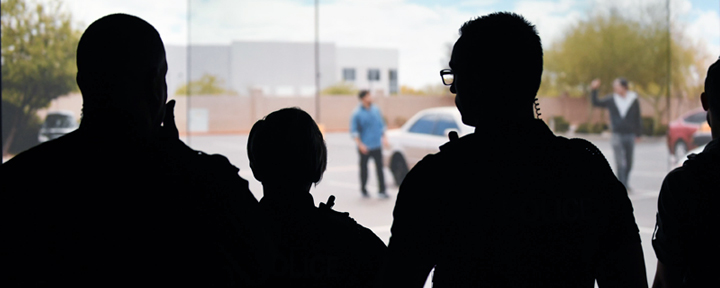
Imagine you are training in an immersive law enforcement simulator. The screens darken, then light up with a desert scene as the dispatch relays information on the call you are responding to. Pedestrians give you further information about the event, then point you towards a man sitting on a ledge. It becomes clear: this is a suicide call and you need to carefully persuade the man to seek help, not jump.
This is a difficult situation, but a necessary one to train for, as any officer can be called to prevent suicide. But as important as the training topic is, the method of training is just as important. For officers who train with VirTra’s systems, the scenario will unfold based on the officer’s actions and words, creating real-life training designed to benefit both officers and their communities. Officers can train in the same scenario multiple times, trying new de-escalation tactics or certain phrases, then see how the situation plays out. Does an action cause the man to comply, lash out or jump? Which verbiage best comes into play here? Instructors watch over the trainees and, depending on the officer’s choices, they choose the applicable branch in the situation and thus create a new ending.
Virtual Interactive Coursework Training Academy
The simulator itself is an incredible training tool, but what about combining the classroom and the simulator? VirTra created the V-VICTA® program, which is a series of nationally-certified curriculum that is first taught in the classroom then practiced in the simulator. This all-in-one training solution instills proper training and knowledge transfer, thus helping officers remember their training in the field and utilize it to help those around them.
For example, one V-VICTA curriculum is “Autism Awareness.” This material teaches officers how to identify possible autistic behaviors and the best ways to interact with the subject. Officers who aren’t taught how to recognize and react accordingly to these behaviors could put the subject or themselves at risk. And, according to data from the CDC, 1 in 54 children are diagnosed with autism, making it extremely likely that every field officer will interact with someone on the spectrum. To improve safety for officers and every member of their community, they must first know how to best interact with every member of the community.
Officer training is complex, but it is always centered around safety—for subjects, bystanders, partners and oneself. To learn more about VirTra’s V-VICTA training curriculum, or to try a training simulator at an upcoming trade show, contact a VirTra specialist.
Recently Published
Join Our Newsletter







